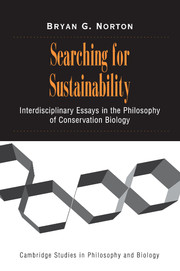Book contents
- Frontmatter
- Contents
- Searching for Sustainability
- General Introduction: An Interdisciplinary Experiment
- I PRAGMATISM AS AN ENVIRONMENTAL PHILOSOPHY
- II SCIENCE, POLICY, AND POLICY SCIENCE
- III ECONOMICS AND ENVIRONMENTAL SUSTAINABILITY
- IV SCALING SUSTAINABILITY: ECOLOGY AS IF HUMANS MATTERED
- V SOME ELEMENTS OF A PHILOSOPHY OF SUSTAINABLE LIVING
- VI VALUING SUSTAINABILITY: TOWARD A MORE COMPREHENSIVE APPROACH TO ENVIRONMENTAL EVALUATION
- 23 Commodity, Amenity, and Morality: The Limits of Quantification in Valuing Biodiversity
- 24 The Cultural Approach to Conservation Biology
- 25 Evaluation and Ecosystem Management: New Directions Needed?
- 26 What Do We Owe the Future? How Should We Decide?
- 27 Environmental Values and Adaptive Management, with Anne Steinemann
- Index
- References
26 - What Do We Owe the Future? How Should We Decide?
Published online by Cambridge University Press: 21 January 2010
- Frontmatter
- Contents
- Searching for Sustainability
- General Introduction: An Interdisciplinary Experiment
- I PRAGMATISM AS AN ENVIRONMENTAL PHILOSOPHY
- II SCIENCE, POLICY, AND POLICY SCIENCE
- III ECONOMICS AND ENVIRONMENTAL SUSTAINABILITY
- IV SCALING SUSTAINABILITY: ECOLOGY AS IF HUMANS MATTERED
- V SOME ELEMENTS OF A PHILOSOPHY OF SUSTAINABLE LIVING
- VI VALUING SUSTAINABILITY: TOWARD A MORE COMPREHENSIVE APPROACH TO ENVIRONMENTAL EVALUATION
- 23 Commodity, Amenity, and Morality: The Limits of Quantification in Valuing Biodiversity
- 24 The Cultural Approach to Conservation Biology
- 25 Evaluation and Ecosystem Management: New Directions Needed?
- 26 What Do We Owe the Future? How Should We Decide?
- 27 Environmental Values and Adaptive Management, with Anne Steinemann
- Index
- References
Summary
OUR BEQUEST TO THE FUTURE
Each generation, either thoughtlessly or thoughtfully, leaves a bequest to generations that follow it. One of the purposes of this book is to ask, Should a restored and flourishing population of wolves in the Adirondack mountains be a part of our generation's bequest to future generations? As my contribution to the analysis of this case study, I intend to focus on how best to understand, formulate, and analyze this question as a question of public values, which, like all important aspects of ecological restoration, must be addressed in an open and democratic public process.
For most of our history as a transplanted civilization, North Americans of European descent have concentrated on two aspects of the bequest they would leave future generations: the moral, spiritual, and cultural aspect and the economic aspect. Early in our history, colonists explicitly stated that it was their purpose to “build a city on a hill” and to set an example of spirituality and righteousness. Today, it seems, most concern for the future centers on building wealth, great cities, and technological prowess – in other words, on maximizing economic growth. Both of these two broad aspects relate to the human heritage – the spiritual and the economic – portion of our bequest. North American nations have, in my view correctly, tried to minimize the role of their government and public actions in shaping the spiritual aspect of intergenerational bequests.
- Type
- Chapter
- Information
- Searching for SustainabilityInterdisciplinary Essays in the Philosophy of Conservation Biology, pp. 493 - 513Publisher: Cambridge University PressPrint publication year: 2002



